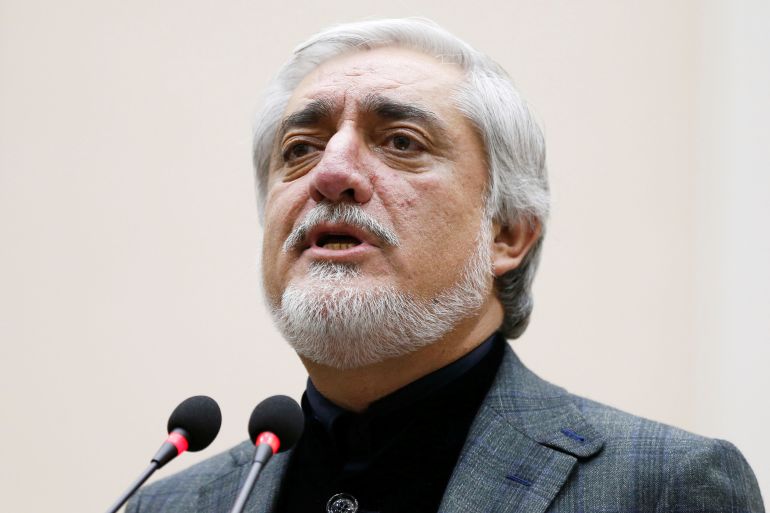Profile: Abdullah Abdullah
In his current role, Abdullah is tasked with managing long-stalled peace talks with the Taliban in the Qatari capital Doha.

Abdullah Abdullah is the chairman of the High Council for National Reconciliation (HCNR), a role he took on after coming to an agreement with President Ashraf Ghani after presidential elections in 2019 that were once again mired in accusations of widespread fraud.
The 60-year-old Abdullah, a former ophthalmologist and resistance fighter, has made a name for himself abroad for his fluent English and courtly manner over a long political career.
Keep reading
list of 4 itemsThe Taliban explained
‘Journalism is sacred work’: Afghanistan’s front line reporters
‘We’ll stay here and die’: War-weary Afghans resigned to fate
In his current role, he is tasked with managing long-stalled peace talks between the Afghan government and the Taliban in the Qatari capital Doha.
Denied the presidency?
The 2019 presidential election, which had the lowest turnout ever for an Afghan election, were highly contested and both Abdullah and Ghani declared themselves victors, echoing a similar standoff in 2014.
In March 2020, nearly seven months after the election, they held duelling inaugurations only kilometres apart in the capital Kabul.
Unlike in 2014, Washington refused to get involved in the dispute and urged both men to resolve their issues. It took two more months to reach an agreement that made Ghani president and gave Abdullah responsibility for talks with the Taliban once they began.
In 2014, Abdullah was given the role of chief executive after then-US Secretary of State John Kerry made two trips to Kabul and a UN-led recount of the June 2014 runoff was conducted.
Abdullah had claimed to have won the first round in April 2014 with 45 percent compared with rival Ashraf Ghani’s 31.6 percent.
However, Afghanistan’s election law requires at least 51 percent to win the presidency and the results of a second round in June showed Ghani getting 56.44 percent.
Abdullah charged massive vote fraud in both rounds and said he was the rightful winner.
He had also alleged fraud in the 2009 election, which he lost to former President Hamid Karzai. The two men decided against holding a second round at the time.
Building ties
Born to Tajik parents but raised by a Pashtun stepfather, Abdullah grew up in Kabul with close ties to two of Afghanistan’s largest ethnicities.
During the war against the Soviet invasion of the 1980s, he became a close confidant and ally of Ahmad Shah Massoud, the charismatic Tajik commander in the fight against the Soviets, giving him greater recognition with the Tajiks.
Abdullah spent his time in the political opposition building ties with tribal leaders and staying close to the US, a major backer of the Mujahideen forces alongside whom Abdullah fought during the occupation.
He was a member of the government of Burhanuddin Rabbani, through the civil war from 1992 to 1996, when Kabul fell to the Taliban.
His formative political experience was as right-hand man to Massoud, who formed the Northern Alliance to fight against the Taliban.
Massoud was killed two days before the September 11, 2001, attacks on the US, leaving Abdullah fearing that anti-Taliban resistance would collapse.
But the US’s reaction to the deadly attacks on New York and Washington, DC, transformed the landscape overnight, with the Taliban soon overthrown and Abdullah emerging as foreign minister in the new interim government under Karzai.
Abdullah used the post to pass an early warning to Washington that Taliban leaders were running a growing rebellion from Pakistan – an issue that was dismissed until it became central to US foreign policy years later.
His anti-Taliban record could make starting a peace process with the fighters tricky, but he has met with them several times in Doha since taking on his current role.
Abdullah is married with three children. His family has lived in India for years.